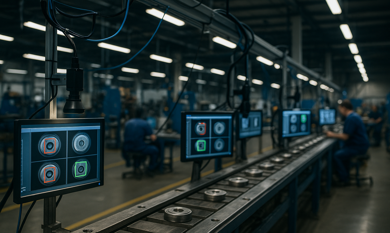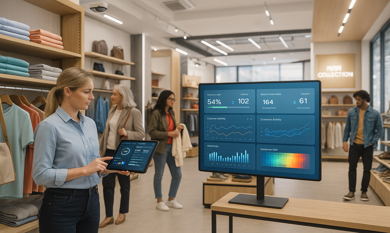The healthcare industry continues to evolve toward digital transformation, yet administrative workloads remain a persistent challenge. From managing billing and claims to updating patient data and coordinating schedules, healthcare professionals spend significant time on repetitive back-office processes. These manual tasks not only slow down operational efficiency but also increase the risk of human error and compliance issues.
This is where Robotic Process Automation (RPA) steps in as a game-changer. Unlike AI systems that make predictions or decisions, RPA executes structured, rule-based workflows that replicate human actions on software systems. It enables hospitals, clinics, and healthcare organizations to automate time-consuming processes, reduce costs, and enhance accuracy across administrative operations. In short, RPA in healthcare operations is redefining how institutions handle paperwork, billing, and patient data management.
Pain Points in Healthcare Administration
Despite advancements in healthcare technologies, many administrative workflows still rely on manual intervention. These repetitive tasks create inefficiencies and bottlenecks across departments:
- Manual patient data entry: Staff often re-enter the same data across EHR, billing, and insurance systems, increasing the likelihood of errors.
- Delayed billing and claims processing: Paper-based or partially automated billing systems result in payment delays and reconciliation issues.
- Scheduling and reporting inefficiencies: Hospitals manage thousands of appointments and reports daily, making it difficult to maintain accuracy.
- Compliance and audit fatigue: Healthcare providers must adhere to strict regulations like HIPAA, where even a small data mismatch can lead to penalties.
The result? Staff exhaustion, slower reimbursements, and lower patient satisfaction. These problems stem not from lack of skill but from repetitive administrative tasks that can be easily automated. Reducing human error in hospital administration has therefore become a top priority for digital healthcare leaders.
How RPA Solves These Challenges
RPA automates routine, rule-based tasks without disrupting existing IT systems. Once configured, bots perform operations such as form filling, data transfer, and report generation seamlessly. Here’s how it transforms healthcare workflows:
- Automated Data Entry: RPA bots extract patient data from one system (EHR or CRM) and update it across other connected databases.
- Billing and Claims Automation: Through healthcare automation solutions, bots verify claim details, submit forms, and generate reports, ensuring faster payments and fewer rejections.
- Inventory and Scheduling Management: Bots automatically track stock levels of medicines or equipment and manage appointment reminders.
- Regulatory Documentation: Each activity is logged for easy audit tracking, improving compliance readiness.
Unlike AI, RPA doesn’t “think” or “predict.” It strictly follows predefined rules, ensuring consistency and zero deviation. This reliability makes RPA ideal for healthcare’s structured workflows, where accuracy and timing are critical. Many hospitals are now deploying RPA tools for healthcare industry tasks to free human staff for more patient-facing roles.
Technology Stack / Implementation Overview
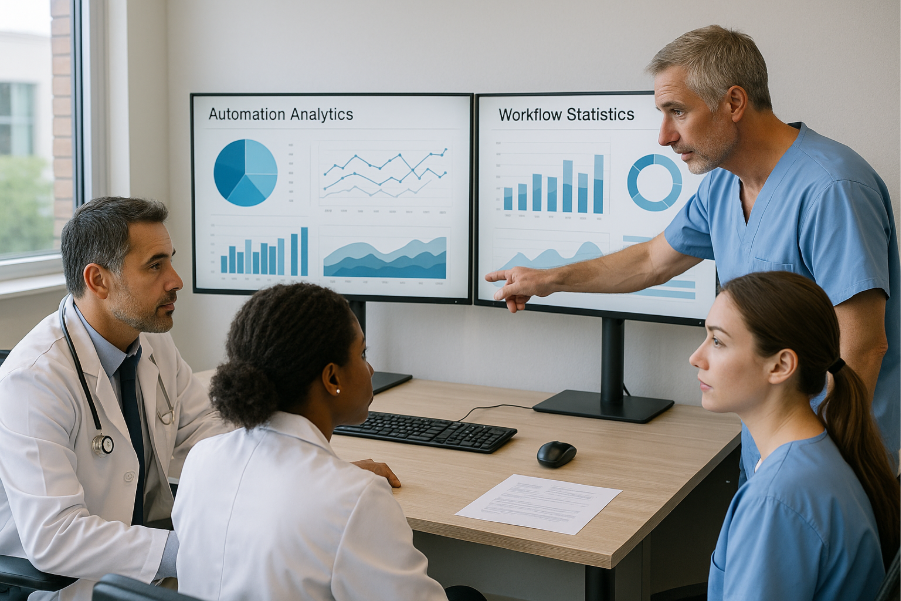
Modern healthcare organizations use leading RPA tools such as UiPath, Blue Prism, and Automation Anywhere to integrate automation into daily workflows. These platforms enable seamless communication with EHR systems, CRMs, and billing software through APIs or screen automation.
Implementing RPA starts with identifying high-volume, repetitive tasks — like patient registration or claim submission — and creating automation scripts that mimic human actions step by step. Integration is non-invasive, meaning no major software overhaul is required.
For hospitals seeking tailored solutions, partnering with a custom software development company in Ahmedabad ensures scalability, HIPAA compliance, and secure integration with existing digital ecosystems.
Including elements like dashboards for monitoring and exception handling further improves control over automated workflows, ensuring transparency and adaptability.
Real Implementation Insight
A strong example of RPA adoption in healthcare comes from the Cleveland Clinic in the United States. The organization implemented RPA to automate administrative workflows such as billing, patient registration, and claims verification across multiple departments. Read more
Through this automation initiative, the clinic was able to significantly streamline its back-office operations. Routine tasks that once required constant manual attention are now handled automatically, ensuring greater accuracy and faster turnaround. The shift also allowed medical and administrative staff to dedicate more time to patient-facing roles, enhancing both efficiency and service quality.
By automating medical billing and claims, the Cleveland Clinic demonstrated how healthcare institutions can achieve smoother, more reliable workflows using rule-based RPA — without relying on complex AI or machine learning systems.
Development ROI
RPA delivers measurable value to healthcare operations, both in efficiency and financial terms. When properly implemented, the RPA development services Ahmedabad teams have recorded results such as:
- 40–60% reduction in manual entry time for claims and billing.
- 70% fewer human errors in administrative processes.
- Up to 50% cost reduction in back-office workflows due to reduced manual intervention.
Beyond numbers, RPA improves accuracy, transparency, and operational agility. Hospitals can focus staff on clinical excellence rather than clerical work. In many cases, the return on investment becomes evident within 6–8 months of deployment, especially when integrated with EHR and CRM systems for continuous workflow optimization.
Organizational Advantage
Beyond immediate ROI, the long-term commercial benefits of robotic process automation in healthcare are substantial:
- 24/7 Operational Continuity: RPA bots run continuously, ensuring no delay in report generation, data transfers, or claims submissions.
- Compliance Readiness: Automated documentation ensures audit trails are always accurate and accessible.
- Cost Efficiency at Scale: As workflows expand, new processes can be automated with minimal additional cost.
- Improved Staff Productivity: Staff can focus on higher-value tasks like patient interaction and service optimization.
- Faster Reimbursements: Automating claim cycles shortens turnaround time and improves cash flow.
In short, healthcare process automation software not only improves internal operations but also enhances external service delivery and overall patient trust.
Why Choose Us
At Theta Technolabs, we specialize in helping healthcare institutions modernize their administrative systems with RPA-driven efficiency. Our expertise spans Web, Mobile, and Cloud solutions, enabling seamless integration between your existing systems and RPA workflows.
Whether you’re automating patient data handling, billing, or inventory management, our team ensures secure, scalable, and compliant implementations tailored to your operational goals. Theta Technolabs helps healthcare organizations unlock measurable productivity gains through structured automation — not guesswork.
Conclusion
RPA has become a cornerstone of operational efficiency in the healthcare sector. By eliminating repetitive manual tasks and reducing error rates, it ensures better compliance, faster turnaround, and improved patient experience. Healthcare organizations adopting RPA are witnessing a clear shift from administrative overload to intelligent process management.
As an AI development company in Ahmedabad, Theta Technolabs continues to empower healthcare providers with secure, compliant, and high-performing automation solutions across Web, Mobile, and Cloud platforms. By integrating RPA into administrative systems, hospitals can move closer to full digital transformation — where precision and efficiency become the norm.
Get in Touch
Transform Your Healthcare Operations with RPA
Looking to streamline your hospital or clinic workflows?
Connect with Theta Technolabs — your partner in automation and digital innovation.
📧 Contact: sales@thetatechnolabs.com
Explore our full range of solutions:
- Web Application Development for digital patient portals
- Mobile App Development for appointment scheduling and record access
- Cloud Consulting Services for secure data management and scalability
Empower your healthcare operations with automation that delivers real results.
FAQ's
Q1. How does RPA differ from AI in healthcare operations?
RPA automates repetitive, rule-based tasks like billing or scheduling, while AI handles learning and prediction. RPA doesn’t make decisions — it executes rules with precision.
Q2. Which healthcare processes benefit most from RPA?
RPA is ideal for billing, claim submission, patient data entry, report generation, and inventory tracking — all repetitive and structured processes.
Q3. How long does it take to implement RPA in a healthcare setup?
A pilot RPA project typically takes 4–6 weeks to deploy, depending on workflow complexity and integration needs.
Q4. What is the ROI of RPA in healthcare administration?
Hospitals experience 40–60% workload reduction and significantly faster processing times within the first few months of implementation.



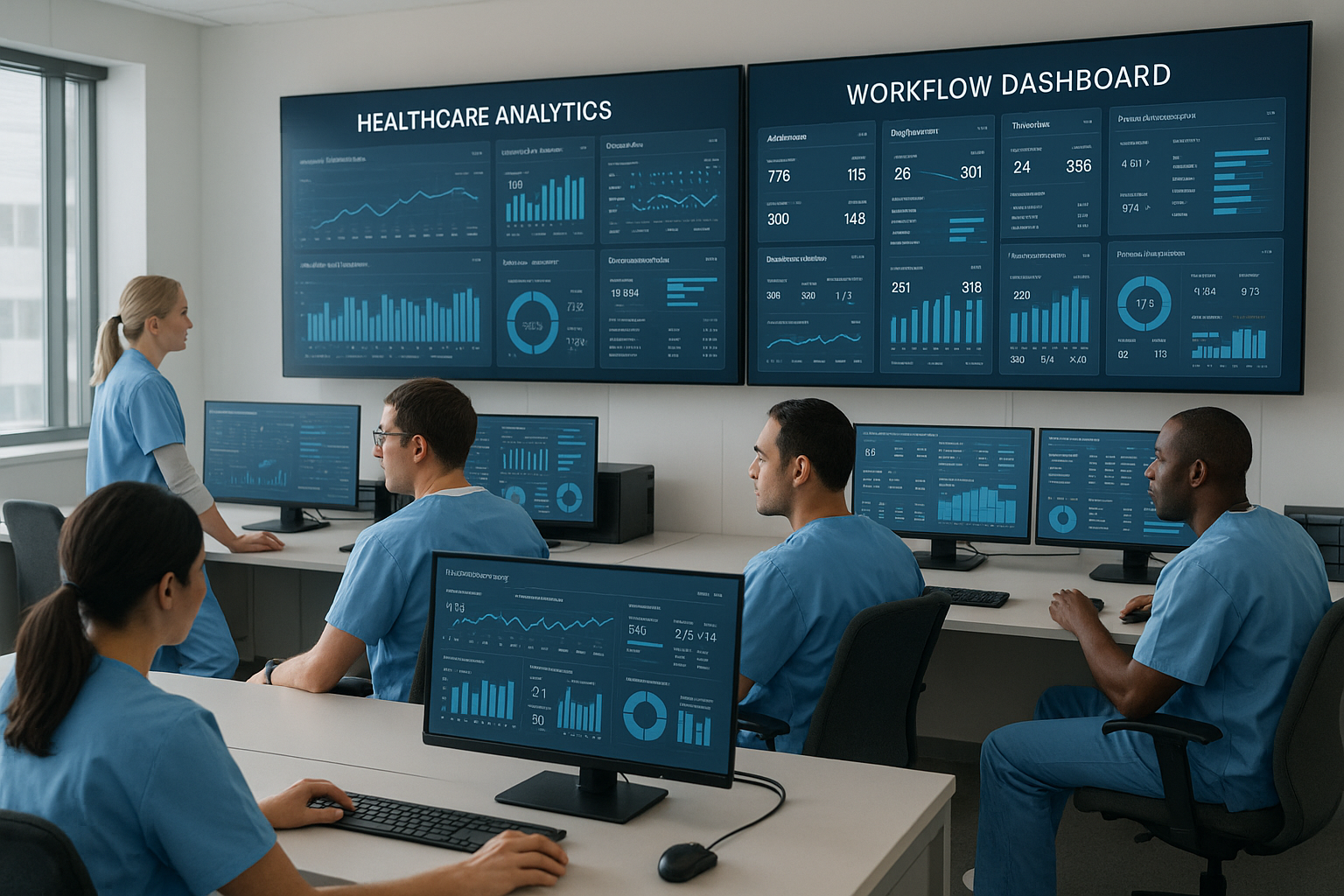














_Computer%20Vision-enabled%20Web%20and%20Mobile%20Interfaces%20for%20Mall%20Management%20in%20Dubai_Q1_In_24.avif)
_Smart%20Solutions%20for%20Healthcare_%20How%20IoT%20Development%20is%20Reshaping%20Dubai%20Hospitals_Q1_In_24.avif)
_Automated%20Checkout%20Systems.avif)
_Smart%20Manufacturing%20in%20Dubai_%20How%20AI%20is%20Driving%20Efficiency%20and%20Innovation_Q1_In_24.avif)

_Understanding%20the%20Impact%20of%20AI%20and%20Machine%20Learning%20on%20Fintech%20Web%20Apps%20in%20Dubai_Q2_24.avif)
_Explore%20the%20Best%20Cross-Platform%20App%20Development%20Frameworks%20of%202024_Q3_24.avif)


_Top%20Benefits%20of%20Cloud%20Computing%20for%20All%20Business%20Sectors_Q2_24.avif)
_Integrating%20IoT%20with%20Mobile%20Apps%20for%20Advanced%20Renewable%20Energy%20Solutions_Q2_24.avif)


_The%20Transformative%20Role%20of%20Open%20Banking%20APIs%20in%20Fintech%20for%202024_Q3_24.avif)
_Choosing%20the%20Right%20Computer%20Vision%20Development%20Partner%20in%20Ahmedabad%20for%20Construction_Q3_24.avif)
_Node.js%20and%20Blockchain_%20A%20Perfect%20Pair%20for%20Fintech%20Innovation%20in%20Dubai_Q3_24.avif)
_How%20AI%20Development%20Companies%20in%20Ahmedabad%20are%20Transforming%20the%20Shopping%20Experience_Q4_25.avif)
_How%20IoT%20Can%20Reduce%20Energy%20Costs%20in%20Smart%20Factories_Q4_25.avif)













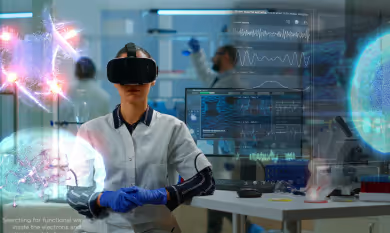









.avif)
.avif)
.avif)




















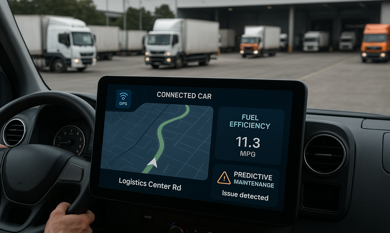
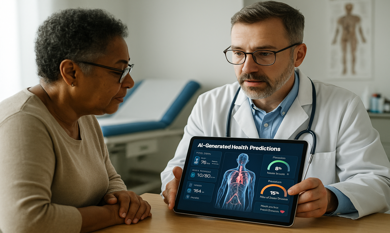










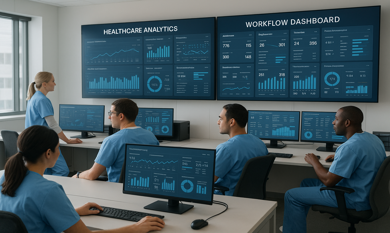




.png)





.png)
